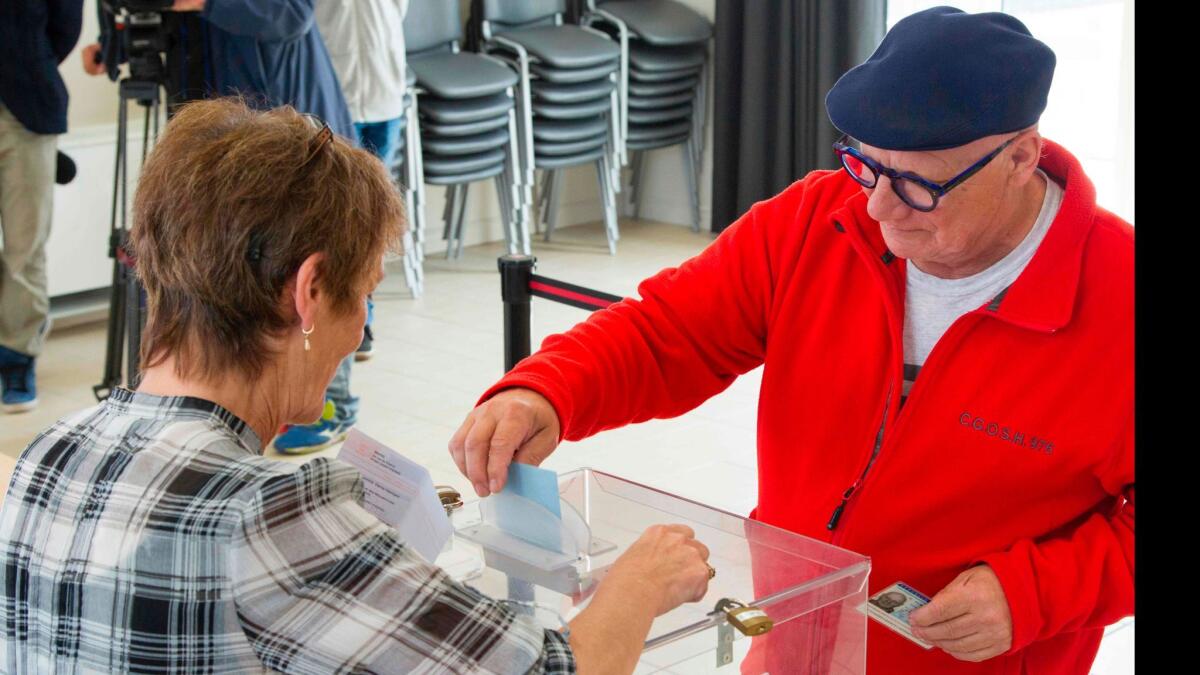Macron’s party upbeat about Sunday’s second-round vote in run for Parliament

Reporting from Paris — At the Thursday morning fruit and vegetable market at Saint Marceau, a suburb of the historic French city of Orleans, Dr. Stephanie Rist stood under a clutch of colorful balloons talking to locals about their problems.
Just a couple of weeks ago, few would have known who she was. But now, Rist, a rheumatologist at the city’s public hospital, is en route to becoming their most powerful ally.
This 43-year-old medic is one of President Emmanuel Macron’s amateur army of would-be lawmakers seeking a place in the country’s lower house of Parliament, the National Assembly.
Just three days to the second-round vote on Sunday, Rist was upbeat; justifiably so given the polls predicting a landslide for Macron’s fledgling centrist party La Republique En Marche, or LREM. Political analysts predict it is on track to win an absolute majority of well over 400 in the 577-seat house. Pollsters Opinionway say the figure for LREM and its centrist partner party MoDem could be as high as 470 seats, crushing all opposition.
The one damper is the estimated 53% of voters not expected to bother to turn out, which would be a historically high level.
Of all the candidates LREM fielded in the two-round vote, half are women and half drawn from civil society having never held any elected public office. Their average age is 46.
Rist is typical of the young, professional, middle-class novices surfing the wave of optimism that has followed Macron’s election last month.
Until last year, when Macron set up his En Marche! (Onward!) movement, she had never felt strongly enough to join a political party or support local or national candidates on the stump.
The daughter of a chef and a secretary, Rist excelled at school, and enjoyed helping out in the bar of her father’s Paris bistro during vacations.
“I was useless as a cook so I couldn’t be in the kitchen,” she said.
After completing her medical internship at Orleans hospital, southwest of Paris, Rist finished her studies at the celebrated Necker Children’s Hospital in the French capital. To pay her way she took various temporary hospital jobs.
“I worked in all positions in the hospital, from secretary, to health assistant to nurse…. It seemed important not only to earn money while I was studying but to find out how the hospital worked at every level,” she said.
Clutching her medical qualification, Rist returned to Orleans on the Loire River to work at the city’s main public hospital.
In 2016, when Macron set up his En Marche! movement, he launched a nationwide consultative process involving experts and ordinary supporters across the country to draw up the basis of a new political program.
Rist was immediately sucked into Macron’s people’s movement, run on a shoestring, funded by public donations, staffed by volunteers and with little real expectation at that time of becoming more than a well-meaning lobbying group.
When Macron won the presidential vote in May and began looking for people to support him in Parliament, Rist applied to become a candidate.
“I may have no political experience but I have real experience of what’s going on in society. The vote shows people want those who are not the same old experienced politicians. We have new vision, we want to make politics different,” she said.
In the Loire Valley, where Romans, Attila the Hun and the English marauded through history, and whose most famous resident was Joan of Arc, Rist’s constituency includes part of the city, as well as peri-urban and agriculture-dependent areas around it. Local problems are those hitting most of rural France: unemployment, a crisis in health and social provision, dwindling public transportation services, unreliable cellphone coverage and a lack of high-speed Internet.
Out electioneering, the mother of three says voters are glad to see new faces and not the “same old politicians” seeking reelection.
“There’s real enthusiasm and a sense of hope. It’s the idea that we are building something new with their participation that is really exciting We are going forward together,” she said.
Not all are happy with the prospect of a Macron electoral landslide, however, as witnessed by low turnout in the first round vote; more than half the electorate appears not to have bought into the new president’s “renewal” program.
Many voters feel orphaned by the destruction of the traditional right and left parties. While the center-right Republicans are expected to form the biggest group in Parliament after LREM, the Socialist Party is facing a wipeout.
Laurent Joffrin, the director of the left-leaning Liberation newspaper, wrote that France’s left were like “the last of the Mohicans.”
Gilles Finchelstein, director of the socialist think-tank the Jean-Jaures Foundation, told the right-leaning Le Figaro newspaper: “The Socialist Party is in danger of extinction. It had a leader, an organization, a strategy — the union of the left, an ideology — rupture with capitalism. None of that exists anymore.”
“The PS [Socialist Party] is very clearly dead,” former member of Parliament Jean-Marie Le Guen said after the first-round vote June 11 when it became clear the party would struggle to gain 30 seats.
Sitting in a Paris bar discussing politics with friends this month, Philippe, a retired company executive who did not want to give his full name, said he would vote on Sunday even though “there doesn’t seem to be much point.”
“I’ve the impression LREM could field a chimpanzee as a candidate ‘supported by Emmanuel Macron’ as it says on the election posters, and they would win,” he said.
Rivals have accused inexperienced LREM candidates of being too scared to take part in public debates.
“I don’t even know if the LREM candidates are capable of defending Macron’s program,” Eric Coquerel, a candidate for the hard left France Insoumise (Unbowed France) party told journalists this month.
Political scientist Dominique Reynie, a professor at the respected Sciences-Po university in Paris and director of the progressive think-tank Fondapol, said probably about 70% of the National Assembly would be new faces after Sunday’s vote, compared with around 20% in most general elections.
He warned that Macron was becoming the first “hyper president” accumulating a level of power that might be considered worrying.
“He will face opposition. If not in Parliament then the opposition will be outside,” Reynie said, suggesting voters who did not feel represented by LREM could well take to the streets in protest.
Back in Saint Marceau on a sunny market day, there are no clouds on Stephanie Rist’s horizon. She won 44.67% of the first-round vote, well ahead of her nearest Republican rival, who polled 18.44%.
Rist is almost certain to take up a seat in the National Assembly after Sunday’s second-round vote. Her role, she says, will be to represent local interests and concerns and to make health policy but also “to be realistic and manage expectations.”
“I feel an enormous responsibility. I have to listen to people who tell me their problems but I also have to explain what can and what cannot be done. I have to explain that we cannot solve all their problems,” she says.
Before putting her name forward as one of Macron’s new recruits, she consulted her husband, who runs a small tech company, and children, ages 16, 14 and 10. She says they fully support her.
“My children understand that I may not be around for them, but even now I’m at the hospital long hours, so we have quality rather than quantity time.”
She said she intends to find time to see patients at the Orleans hospital half a day every week to “keep my feet on the ground.”
“It’s really a dream and I’m so excited. But politics is not a career. I won’t be doing this all my life. When I’ve done what I have to do, I’ll go back to my old job or find a new one,” she said.
Bruno Jeanbart, a director at pollsters Opinionway told the Anglo-American Press Assn. in Paris that if LREM won more than 400 seats on Sunday it would be a majority “rarely seen since the end of World War II.”
Winning a crushing majority with an army of mostly independent political amateurs, however, does not guarantee things will go Macron’s way once they take up their seats.
“En Marche! has drawn from a very large spectrum of candidates, from both the left and right, and it remains to be seen if they can stay united when voting on things like labor reform or taxing France’s wealthiest earners,” Jerome Fourquet, the director of opinion pollsters Ifop said.
“The biggest challenges are yet to come.”
Willsher is a special correspondent.
More to Read
Sign up for Essential California
The most important California stories and recommendations in your inbox every morning.
You may occasionally receive promotional content from the Los Angeles Times.










